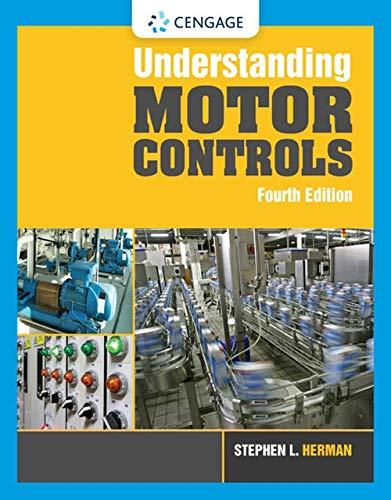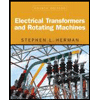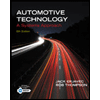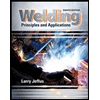
Understanding Motor Controls
4th Edition
ISBN: 9781337798686
Author: Stephen L. Herman
Publisher: Delmar Cengage Learning
expand_more
expand_more
format_list_bulleted
Textbook Question
Chapter 42, Problem 4RQ
A motor is tripping out on overload. The motor nameplate reveals a full load current of 168 amperes. When the motor is operating under load, an ammeter indicates the following: Phase #1 = 166 amperes, Phase #2 = 164 amperes, and Phase #3 = 225 amperes. What is the most likely problem with this motor?
Expert Solution & Answer
Want to see the full answer?
Check out a sample textbook solution
Students have asked these similar questions
I have attached an image, In that they have mentioned the tolerance of 0.4 for all surfaces. I need to know what's the exact tolerance.
Solve this problem and show all of the work
Solve this problem and show all of the work
Chapter 42 Solutions
Understanding Motor Controls
Ch. 42 - What are the three main electrical test...Ch. 42 - What is the advantage of a plunger type voltage...Ch. 42 - A motor is tripping out on overload. The motor...Ch. 42 - A motor is tripping out on overload. The motor...Ch. 42 - Prob. 5RQCh. 42 - Refer to the circuit shown in Figure 42–17. Assume...Ch. 42 - Prob. 7RQCh. 42 - Refer to the circuit shown in Figure 4221. Assume...Ch. 42 - Prob. 9RQCh. 42 - Refer to the circuit shown in Figure 42–21. Assume...
Knowledge Booster
Learn more about
Need a deep-dive on the concept behind this application? Look no further. Learn more about this topic, mechanical-engineering and related others by exploring similar questions and additional content below.Similar questions
- Part A The man pulls on the rope with a force of F = 30 N as shown in (Figure 1). Figure 1.5 m 3 m. 4m 10.5 m 1 of 1 Determine the position vector from O to A. Express the x, y, and z components of the position vector in meters to three significant figures separated by commas. ΜΕ ΑΣΦ vec (TOA). (TOA)y. (TOA)== Submit Request Answer Part B m Determine the position vector from O to B. Express the x, y, and z components of the position vector in meters to three significant figures separated by commas. ΜΕ ΑΣΦ ↓↑ vec (TOB)x, (TOB)y, (TOB) = Submit Request Answer Part C Complete previous part(s) Provide Feedback ? marrow_forward4 Part A The tool is used to shut off gas valves that are difficult to access (Figure 1). Figure 0.25 m 30 0,4 m < 1 of 1 If the force F= {-60i+40j+15k} N is applied to the handle, determine the component of the moment created about the z axis of the valve. Express your answer with the appropriate units. Mz = Value Submit Request Answer Provide Feedback | ? Unitsarrow_forward3. A steam power plant has an average monthly net power delivery of 740 MW over the course of a year. This power delivery is accomplished by burning coal in the boiler. The coal has a heating value of 9150 Btu/lbm. The cost of the coal is $14.20/ton. The overall thermal efficiency of the plant is, nth Wnet Qboiler 0.26 = 26% Determine the annual cost of the coal required to deliver the given average monthly power.arrow_forward
- The cable exerts a force of P = 4 kN at the end of the 8-m-long crane boom. A P 8 m B -x- I'm En ▾ Part A If 0 = 30°, determine the placement x of the boom at B so that this force creates a maximum moment about point O. Express your answer to three significant figures and include the appropriate units. x = 9.81 m Submit Previous Answers ✓ Correct ▾ Part B What is this moment? Express your answer to three significant figures and include the appropriate units. Assume the positive direction is counterclockwise. (Mo) max 43.7 = E ? N Submit Previous Answers Request Answer X Incorrect; Try Again; 28 attempts remaining Enter your answer with a different unit type. Review a list of acceptable units.arrow_forwardFind highest and lowest temperature.arrow_forwardExplained step by step.arrow_forward
- The bevel gear shown in is subjected to the force F which is caused from contact with another gear. Part A F (201+8j 15k) N 40 mm Determine the moment of this force about the y axis of the gear shaft. Express your answer with the appropriate units. My = Value Submit Request Answer ? Units 30 mmarrow_forwardConsider the beam in. Part A 1.5 ft 200 lb 200lb 2 ft 30° 1.25 ft 30° If F 90 lb, determine the resultant couple moment. = Express your answer in pound-feet to three significant figures. Assume the positive direction is counterclockwise. ΑΣΦ vec MR = Submit Request Answer ? lb.ftarrow_forward4. An operating parameter often used by power plant engineers is the heat rate. The heat rate is defined as, HR Qbioler Wnet where Qbioler is the heat transfer rate (Btu/h) to the water in the boiler due to the combustion of a fuel and Wnet is the net power (kW) delivered by the plant. In comparison, the thermal efficiency of the power plant is defined as, nth Wnet Qbioler where the numerator and denominator have the same units. Consider a power plant that is delivering 1000 MW of power while utilizing a heat transfer rate of 3570 MW at the boiler. Determine the heat rate and thermal efficiency of this power plant.arrow_forward
arrow_back_ios
SEE MORE QUESTIONS
arrow_forward_ios
Recommended textbooks for you
 Understanding Motor ControlsMechanical EngineeringISBN:9781337798686Author:Stephen L. HermanPublisher:Delmar Cengage Learning
Understanding Motor ControlsMechanical EngineeringISBN:9781337798686Author:Stephen L. HermanPublisher:Delmar Cengage Learning Electrical Transformers and Rotating MachinesMechanical EngineeringISBN:9781305494817Author:Stephen L. HermanPublisher:Cengage Learning
Electrical Transformers and Rotating MachinesMechanical EngineeringISBN:9781305494817Author:Stephen L. HermanPublisher:Cengage Learning Refrigeration and Air Conditioning Technology (Mi...Mechanical EngineeringISBN:9781305578296Author:John Tomczyk, Eugene Silberstein, Bill Whitman, Bill JohnsonPublisher:Cengage Learning
Refrigeration and Air Conditioning Technology (Mi...Mechanical EngineeringISBN:9781305578296Author:John Tomczyk, Eugene Silberstein, Bill Whitman, Bill JohnsonPublisher:Cengage Learning Automotive Technology: A Systems Approach (MindTa...Mechanical EngineeringISBN:9781133612315Author:Jack Erjavec, Rob ThompsonPublisher:Cengage Learning
Automotive Technology: A Systems Approach (MindTa...Mechanical EngineeringISBN:9781133612315Author:Jack Erjavec, Rob ThompsonPublisher:Cengage Learning Welding: Principles and Applications (MindTap Cou...Mechanical EngineeringISBN:9781305494695Author:Larry JeffusPublisher:Cengage Learning
Welding: Principles and Applications (MindTap Cou...Mechanical EngineeringISBN:9781305494695Author:Larry JeffusPublisher:Cengage Learning

Understanding Motor Controls
Mechanical Engineering
ISBN:9781337798686
Author:Stephen L. Herman
Publisher:Delmar Cengage Learning

Electrical Transformers and Rotating Machines
Mechanical Engineering
ISBN:9781305494817
Author:Stephen L. Herman
Publisher:Cengage Learning

Refrigeration and Air Conditioning Technology (Mi...
Mechanical Engineering
ISBN:9781305578296
Author:John Tomczyk, Eugene Silberstein, Bill Whitman, Bill Johnson
Publisher:Cengage Learning

Automotive Technology: A Systems Approach (MindTa...
Mechanical Engineering
ISBN:9781133612315
Author:Jack Erjavec, Rob Thompson
Publisher:Cengage Learning

Welding: Principles and Applications (MindTap Cou...
Mechanical Engineering
ISBN:9781305494695
Author:Larry Jeffus
Publisher:Cengage Learning
Mod-01 Lec-16 Basics of Instrumentation; Author: nptelhrd;https://www.youtube.com/watch?v=qbKnW42ZM5c;License: Standard YouTube License, CC-BY